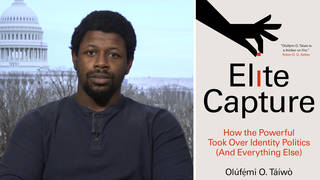
By Amy Goodman with Denis Moynihan
“You may write me down in history
With your bitter, twisted lies,
You may tread me in the very dirt
But still, like dust, I’ll rise.”
wrote Maya Angelou, in her poem “Still I Rise.” She died this week at 86 at her home in North Carolina. In remembering Maya Angelou, it is important to recall her commitment to the struggle for equality, not just for herself, or for women, or for African Americans. She was committed to peace and justice for all.
“If growing up is painful for the Southern Black girl, being aware of her displacement is the rust on the razor that threatens the throat,” she wrote in the opening pages of her first breathtaking autobiography, “I Know Why the Caged Bird Sings,” which chronicles her childhood to the age of 17. Born Marguerite Ann Johnson in St. Louis, at the age of 7 or 8, she was raped by her mother’s boyfriend. He was killed shortly thereafter. As a result of the trauma, she remained virtually silent for five years, speaking only to her brother. She became a single mother at 17, and struggled to support her son as she worked a variety of jobs, eventually gaining success as a calypso singer.
She heard Martin Luther King, Jr. address the Harlem Writers Guild, of which she was a member, and joined with a fellow performer to produce and sing in “Cabaret for Freedom” in Greenwich Village, to raise funds for King’s Southern Christian Leadership Conference. By some accounts it was King, or the legendary activist and organizer Bayard Rustin, who asked her to take on a leadership role with the SCLC, which she accepted, becoming the group’s Northern coordinator.
Maya Angelou became a supporter of Fidel Castro and the Cuban revolution. She met and fell in love with a South African civil-rights activist, and they moved to Cairo with her son. They stayed together for three years, but she stayed on in Africa, moving to Ghana, where she met Malcolm X. The two collaborated on the pivotal political project that Malcolm X was developing, the Organization of Afro-American Unity. She returned to the U.S. to support the effort, but Malcolm X was assassinated shortly after her return. That tragedy, and the 1968 assassination of her friend Dr. Martin Luther King Jr., devastated Angelou. It was in 1969 that she was encouraged by the author James Baldwin, among others, to focus on her writing. Thus was born her first of seven autobiographies and the phenomenal career for which Angelou is known around the world. Reciting her poem “On the Pulse of Morning” at President Bill Clinton’s first inaugural in 1993 catapulted her into the mainstream consciousness.
While some schools and libraries still censor her work for unflinchingly depicting the life she led, it was through my hometown library, while in my early teens, that I first saw Maya Angelou. The library invited her to speak, and speak she did—and danced, and sang, in a display of talent that made us laugh, cry and gasp as she moved her black and white audience of hundreds … together.
In commemorating Maya Angelou, none can speak as eloquently as she did herself about people who inspired her. At the Democratic National Convention in Boston in 2004, she spoke of Fannie Lou Hamer, who attempted, 40 years earlier, to gain recognition for the Mississippi Freedom Democratic Party. Angelou said: “In the most private part of the heart of every American lives a burning desire to belong to a great country. To represent a noble-minded country where the mighty do not always crush the weak and the dream of democracy is not in the sole possession of the strong.”
Maya Angelou’s tribute two years later, on the passing of her friend Coretta Scott King, could be said of Angelou herself: “She was a quintessential African-American woman. Born in the small-town, repressive South. Born of flesh and destined to become iron. Born a cornflower and destined to become a steel magnolia.”
In eulogizing actor and activist Ossie Davis at his 2005 memorial service in Harlem’s historic Riverside Church, Maya Angelou’s delivery was poetic as always. Her words of reflection on his death can serve as well as we note her passing:
“When great trees fall, rocks on distant hills shudder. Lions hunker down in tall grasses, and even elephants lumber after safety. When great trees fall in forests small things recoil into silence, their senses are eroded beyond fear. … Great souls die, and our reality bound to them takes leave of us.”
Maya Angelou’s eloquence, in her poetry, lives on:
“Out of the huts of history’s shame
I rise
Up from a past that’s rooted in pain
I rise
…Bringing the gifts that my ancestors gave,
I am the dream and the hope of the slave.
I rise
I rise
I rise.”
Amy Goodman is the host of Democracy Now!, a daily international TV/radio news hour airing on more than 1,200 stations in North America. She is the co-author of “The Silenced Majority,” a New York Times best-seller.
© 2014 Amy Goodman
Distributed by King Features Syndicate











Media Options